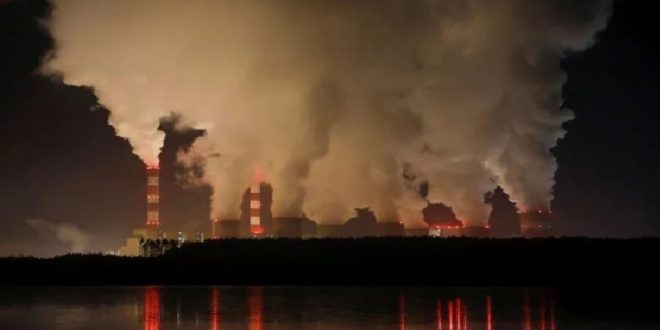14-11-2024
BAKU: Global carbon dioxide emissions, including those from burning fossil fuels, are set to hit a record high this year, pulling the world further off course from averting more destructive climate extremes, scientists said on Wednesday.
 The Global Carbon Budget report, published during the UN’s COP29 climate summit in Azerbaijan, said global CO2 emissions are set to total 41.6 billion metric tons in 2024, up from 40.6 billion tons last year.
The Global Carbon Budget report, published during the UN’s COP29 climate summit in Azerbaijan, said global CO2 emissions are set to total 41.6 billion metric tons in 2024, up from 40.6 billion tons last year.
The bulk of these emissions are from burning coal, oil and gas. Those emissions would total 37.4 billion tons in 2024, up by 0.8% in 2023, the report said.
The rest are from land use, a category that includes deforestation and forest fires. The report by more than 80 institutions was led by the University of Exeter in Britain.
“We don’t see a sign of fossil fuel emissions peaking in 2024,” said lead author Pierre Friedlingstein, a climate scientist at the University of Exeter.
Without immediate and steep emissions cuts worldwide, “we will just go straight into the 1.5C target, we’ll just pass it and continue,” he said.
Countries agreed under the 2015 Paris Agreement to try to stop global temperatures rising more than 1.5 degrees Celsius (2.7 degrees Fahrenheit) to avoid climate change’s worst impacts.
This would require steep emissions cuts every year from now until 2030 and beyond.
Progress, however, was sharply uneven with rich industrialized nations’ emissions decreasing, and emerging economies’ emissions still rising.
Tensions between nations erupted on Tuesday at COP29 over who should lead the world’s transition away from fossil fuels which produce around 80% of global energy.
COP29 host Azerbaijan’s President Ilham Aliyev accused Western countries of hypocrisy for lecturing others while still being major consumers and producers of fossil fuels.
 Emissions in the US, the world’s top oil and gas producer and consumer, are expected to decrease by 0.6% this year, while European Union emissions are set to fall by 3.8%.
Emissions in the US, the world’s top oil and gas producer and consumer, are expected to decrease by 0.6% this year, while European Union emissions are set to fall by 3.8%.
Meanwhile, India’s emissions will rise by 4.6% this year, driven by soaring power demand fuelled by economic growth.
Emissions in China, today the world’s biggest emitter and second-largest oil consumer, are set to marginally increase by 0.2%. The authors said China’s emissions from oil use have likely peaked, as electric vehicles gain market share.
Emissions from international aviation and shipping are also expected to jump by 7.8% this year, as air travel continues to recover from a drop in demand during the COVID-19 pandemic.
The president of Azerbaijan, host of this year’s UN climate summit, lashed out at Western critics of his country’s oil and gas industry on Tuesday.
In his keynote address at the COP29 climate summit, where nearly 200 nations are negotiating global action on climate change, President Ilham Aliyev described his country as a victim of a “well-orchestrated campaign of slander and blackmail”.
Within moments, UN Secretary General Antonio Guterres took to the stage to say that doubling down on fossil fuels was an absurd strategy.
The opposing views underscored the challenge at the heart of the climate negotiations: while nations are urged to shift to green energy sources, many, including wealthy Western nations, continue to rely on fossil fuels.
Azerbaijan’s finance ministry said the share of oil and gas as a contribution to the economy was declining as the country diversifies.
“As a president of COP29 of course, we will be a strong advocate for green transition. (Int’l Monitoring Desk)
 Pressmediaofindia
Pressmediaofindia




